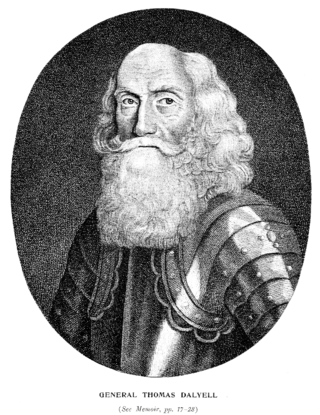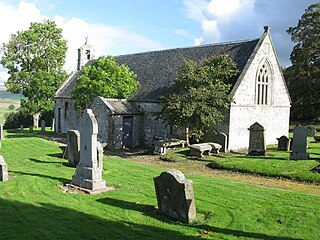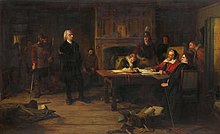
John Michael Welsh of Irongray was a leader of the Scottish Covenanter movement. Dunlop, an early 20th century writer, says: "It is a noteworthy fact that there exists no memoir of John Welsh of Irongray, though from the Battle of Rullion Green till Bothwell Bridge he was the most conspicuous Covenanting minister in Scotland. Had he glorified God in the Grassmarket, or fallen in some scuffle with Claverhouse's dragoons, or even like his friend Blackadder of Troqueer languished in prison on the Bass Rock, some pious hand would have been moved to write his story." Dunlop also wrote: "The events of Welsh's life must be sought for in the pages of Wodrow and Kirkton and in the letters and State papers of the reign of Charles II. After spending a fortnight hunting him in the British Museum, I have come to sympathise with Clavers and his dragoons. Mr John Welsh is a most elusive gentleman."

Robert Wodrow was a Scottish minister and historian, known as a chronicler and defender of the Covenanters. Robert Wodrow was born at Glasgow, where his father, James Wodrow, was a professor of divinity. Robert was educated at the university and was librarian from 1697 to 1701. From 1703 till his death, he was parish minister at Eastwood, near Glasgow. He had sixteen children, his son Patrick being the "auld Wodrow" of Burns's poem Twa Herds.

Sir Thomas Dalyell of The Binns, 1st Baronet was a Scottish Royalist general in the Wars of the Three Kingdoms, also known by the soubriquets "Bluidy Tam" and "The Muscovite De'il".

John Nisbet (1627–1685) was a Scottish covenanter who was executed for participating in the insurgency at Bothwell Brig and earlier conflicts and for attending a conventicle. He took an active and prominent part in the struggles, of the Covenanters for civil and religious liberty. He was wounded and left for dead at Pentland in 1666 but lived and fought as a captain at Bothwell Bridge, in 1679. He was subsequently seized and executed as a rebel. He was a descendant of Murdoch Nisbet, a Lollard who translated the Bible into the Scots language.
Robert Hamilton (1650–1701), second baronet of Preston, was one of the leaders of the Scottish Covenanters. He was the son of Sir Thomas Hamilton, and brother of Sir William, first baronet of Preston. Hamilton was educated at Glasgow University under Professor Burnet. He attached himself to the cause of the Covenanters, and appears in command at Drumclog and Bothwell Brig. After the defeat he retired to Holland, where he remained with his brother-in-law, Gordon of Earlston, until the Revolution of 1688. He declined to recognise title of Prince of Orange, on the ground that he was not a Covenanted sovereign. He was arrested in Edinburgh for being concerned in the second Sanquhar Declaration of August, 1692, issued by the "United Societies". On liberation, he left his testimony afresh against backsliding in Church and State, and becomes as far as one person could be the main stay of "the afflicted Remnant." He died, unmarried, aged 51.
John Nevay was a Scottish Covenanter. He was the nephew of Andrew Cant, minister of Aberdeen. He graduated with an M.A. from King's College, Aberdeen, in 1626. He worked as tutor to George, Master of Ramsay. He was licensed by the Presbytery of Dalkeith 14 October 1630 on the recommendation of that of Alford, but left its bounds a fortnight after. He was admitted about 1637 and appointed in 1647 a member of committee to revise the Psalter. He was present at Mauchline Moor in opposition to the royal army in June 1648. He was subsequently pardoned by Parliament on 16 January 1649. Nevay was appointed a commissioner by Parliament for visiting the University of Aberdeen 31 July 1649. He was active in raising the western army in 1650, and in 1651 a prominent supporter of the Protesters. In 1654 he was named by the Council of England on a committee for authorising admissions to the ministry in the province of Glasgow and Ayr. On 23 December 1662 he was banished by the Privy Council from His Majesty's dominions and went to Holland, where he died in 1672, aged about 66.

Robert Dick of Prestonpans was a 17th-century merchant and inspector of salt works to Lord Carringtoune. He was arrested on 4 September 1676 for attending an open-air service in the Pentland Hills.

Patrick Anderson of Walston was a 17th-century minister and Covenanter.

William Bell was a field preacher and 17th century minister.
John Spreul was a town clerk in Glasgow who was educated at the University of Glasgow, where he completed his Master of Arts degree in 1635. His father was the Provost of Renfrew and an MP for Renfrew. After university, he thought about becoming a church minister but could not, in good conscience, sign the Five Articles of Perth. He was converted after hearing a sermon from David Dickson in 1644. He was a writer which is a Scottish term for a lawyer. For example William Lin is described as a Writer to the Signet which would make him a senior lawyer. He became unpopular with some Glaswegian magistrates because of his opposition to Hugh Binning. According to rumours, he potentially fought for the Covenanters at the Battle of Kilsyth. Spreul and John Graham fought together at the Battle of Philiphaugh in September 1645. Spreul became town clerk of Glasgow on 21 October 1645. He fought for the Scottish Covenanters in the Battle of Dunbar. He is reported to have had a very long beard and to have been mocked for it before the Privy Council of Scotland.
Thomas Ross of Nether Pitkerrie, was born about 1614. He was the son of George Ross of Nether Pitkerrie. He continued in Kincardine after the establishment of prelacy and owes his leaving to a meeting with John M'Gilligan.
Robert Ross was a Presbyterian preacher. He did not have a government licence to preach. He was apprehended at Leith and sent to the Bass Rock. He was kept in confinement there for upwards of three months from April 4-July 19, 1679.
James Macaulay was a Presbyterian preacher. He did not have a government licence to preach. He was apprehended at Leith and sent to the Bass Rock. He was kept in confinement there for upwards of three months from 4 April – 19 July 1679.

John M'Gilligen was a 17th-century Presbyterian minister. He resisted the demands of the Episcopalian authorities and was imprisoned on the Bass Rock. His name is sometimes also spelled as John MacKilligen or John M'Killican or John MacKillican or even John M'Gilligine.

Robert MacWard, a covenanting minister, appears to have studied at the University of St. Andrews, where he was for some time regent of humanity. In 1654 he was appointed one of the regents of Glasgow University without competition on 4 August 1653, but resigned the appointment from ill-health, and on 8 September was ordained to the collegiate charge of the Outer High Church, Glasgow, the usual ordination trials being dispensed with. From 1656 to 1659 he had charge of the south district of the parish, in 1660 of the west, and in 1661 of the east. In 1659 he was named for the vice-chancellorship of the university, but the proposal, which was opposed by Robert Baillie, who seems always to have borne him a grudge, was unsuccessful.
William Veitch. He was the youngest son of John Veitch, the minister of Roberton, Lanarkshire. He was educated at the University of Glasgow, graduating with an M.A. in 1659. He became a tutor in the family of Sir Andrew Ker of Greenhead. He was licensed to preach by the Presbytery of Lanark in 1664. Having identified himself with the Pentland Rising, he was outlawed, and escaped to Newcastle, where he became chaplain in the family of the Mayor. In 1671 he was ordained to a meeting-house at Fallowlees, a remote spot among the Simonside Hills, Rothbury. From that he removed to Hanamhall, in the same district, and afterwards to Seaton Hall, Longhorsly. Whilst living at the latter place under the assumed name of William [or George] Johnston, he was arrested on 16 January, and sentenced to the Bass Rock 22 February 1679.. Veitch was liberated on 17 July 1680, and returned to Newcastle. He aided Archibald, Earl of Argyll, in his escape from Scotland in 1681. In 1683 he went to Holland, and in 1685 he was again in Northumberland acting as an agent on behalf of Monmouth. Soon afterwards he was settled as minister of a meeting-house at Beverley, Yorkshire. Having returned to Scotland, he was called to Whitton Hall, Morebattle, April 1688. In 1690 he was minister of Peebles, and in September 1694, he was admitted to Dumfries. He demitted on 19 May 1715. His death was on 8 May 1722. In 1705 he presented to the church two communion cups.

Hugh Mackail, Scottish martyr, was born about 1640 at Liberton, near Edinburgh. His father was Matthew Mackail who was minister at Bothwell before being deprived of his ministry by the government in 1662. At an early age he went to reside with an uncle, Hugh Mackail, one of the ministers of Edinburgh. He entered the University of Edinburgh, studying divinity, where he distinguished himself, graduating, as the records show, in 1658 under Thomas Crawford. Shortly afterward he became chaplain and tutor in the family of Sir James Stuart of Coltness and Goodtrees, then Lord Provost of Edinburgh. In 1661, being then in his twenty-first year, he was licensed by the Presbytery of Edinburgh and afterward preached several times with much success. A sermon which he delivered in the High Church, Edinburgh, in September 1662, in which he declared that "the church of Scotland had been persecuted by an Ahab on the throne, a Haman in the state, and a Judas in the church," gave such offence that a party of horse was sent to apprehend him. He escaped, however, and, after lying concealed in his father's house in Bothwell for some time, retired into Holland, where he improved his time by studying for several years perhaps near Rotterdam. Then, returning to Scotland, he lived chiefly at his father's house, until in November 1666 he joined a rising of the covenanters. After nine days' marching, however, his weak health obliged him to leave the insurgents, and on his way back to Liberton he was arrested, carried to Edinburgh, and committed to the Tolbooth. He was several times brought before the council and tortured with the boot. Finally, after trial, despite the efforts of his cousin, Matthew Mackail, an apothecary, who interceded with James Sharp, archbishop of St. Andrews, on his behalf, Hugh was hanged at the market-cross of Edinburgh on 22 December 1666, amid "such a lamentation," says Kirkton, "as was never known in Scotland before, not one dry cheek upon all the street, or in all the numberless windows in the market-place." According to MS. Jac. V. 7. 22, in the Advocates' Library, "immediately after the execution of the aforementioned four men there came a letter from the king, discharging the executing of more; but the Bishop of St. Andrews kept it up till Mr. Hew was executed," Mackail behaved with great fortitude on the scaffold, addressing the crowd with singular impressiveness. He was buried in Greyfriars churchyard. Wodrow describes him as "universally beloved, singularly pious, and of very considerable learning."

William Gordon was a 17th-century landowner and Covenanter. He is remembered as being a correspondent in Samuel Rutherford's Letters and being one of the biographies in John Howie's Scots Worthies. He was regarded as a man of strong religious convictions and piety. In 1664 he was banished for listening to ministers who lacked a government licence, both at his mother's house and in the woods. He arrived at the Battle of Bothwell Bridge after the fighting was over and, hesitating to surrender, was shot.

Henry Hall was a Covenanter and Church of Scotland elder. He had firm Presbyterian convictions. He tried but was prevented from joining the Pentland Rising. He fought as an officer at Drumclog and at Bothwell Bridge. He was part of a group, along with Richard Cameron and Donald Cargill, who were openly opposed to the government's religious policies. Hall was intercepted at South Queensferry where Robert Middleton, the governor of Blackness Castle, tried to arrest him along with Donald Cargill. Hall managed to hold off the governor but received a mortal headwound from the butt of a gun from a taxman after Cargill had escaped. An unsigned and probably unfinished work known as The Queensferry Paper was found on Hall which caused considerable disquiet when it was read by government supporters.

John King was an outlawed minister of the Covenant, chaplain at one time to Lord Cardross, but seized by Claverhouse among the insurgents after the affair at Drumclog. King was taken to Edinburgh along with another preacher named John Kid. They were each subjected to torture, condemned to death, and executed. Following his death King's head and limbs were displayed at the Netherbow Port on Edinburgh's Royal Mile beside James Guthrie's skull.














